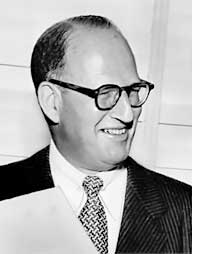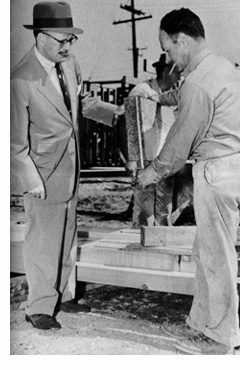Joe Eichler Profile

Joseph Eichler was successful at building uniquely modern house designs and unusually progressive residential communities despite tremendous odds. His success was due to his iron will and his courage to hold steadfast to a vision for suburban communities founded on social and artistic ideals singularly suited to their time and place. Eichler was a lifelong political liberal, and he was guided in his actions by an enduring belief in the American potential for continuing social betterment.
His contribution to the merchant builder community was unique. Rare enough in appearance, the entire conceptual basis for Eichler Homes was almost unbelievably idealistic for the notoriously competitive home-building industry. As one of his founding partners, Jim San Jule, has said of Eichler's developments, "Everything about them was different." The homes and communities Eichler built—modern in both concept and expression, and socially sensitive in their planning—bore the stamp of Eichler's unwavering ideological integrity and swaggering self confidence.
Born in New York to European Jewish parents, Eichler was raised in a politically liberal family that revered Franklin Roosevelt, and grew to maturity in the culturally diverse community of New York City. His education was pragmatic; a business degree from New York University and a career start on Wall Street helped prepare Joe for a business career. A competitive man by nature and cultivated in the tough-minded atmosphere of America's financial capital, Joe was primed for leadership in business. He would eventually join the highly competitive wholesale food industry, working for his in-laws' family-run poultry concern. The Eichlers moved to the West Coast in 1940, where Joe assumed the position of treasurer for the family business, which was based in San Francisco. By this time the Eichler family included his wife, Lillian, and two sons, Richard and Edward, or Ned. Now 40, Joe was, by all ordinary measures of the day, a highly successful man. Events during the next few years would cause Eichler to start over with an entirely new career.

In 1942, Eichler spotted a rare opportunity for his family, and rented a Frank Lloyd Wright Usonian, known as the Bazett House, in Hillsborough from an Air Force pilot who was stationed overseas. The experience Eichler had living in this house would change his life. Eichler, who had been an admirer of Wright, now gained a deeper appreciation for his architecture. He was intrigued by the Bazett house and delighted in its spatial complexities—the overlapping of exterior and interior, and the way daylight filtered in from so many directions, changing the mood of each room throughout the day. Three years of living in the Bazett house may very well have loosened Joe Eichler's spirit enough to allow him to feel his own internal stirrings for creative self-expression. So, when a scandal involving the family business forced Eichler to seek a new career, his experience in this house was in large part what inspired him to launch a home-building concern.
When the war ended, Eichler began his new venture, building prefabricated houses on individual lots. Over the next two years, Joe developed the company to the point where he was building small tracts. Meanwhile, no doubt thinking of his family's enjoyment of the Wright house during the war, Joe sought out an architect to design them a new family home. He settled on Robert Anshen, a young architect educated at the University of Pennsylvania, who was beginning a practice of his own after working for the Navy on local projects during the war. Anshen was tremendously energetic and a truly gifted designer who, like many of his generation, could not help but be influenced by the work of Frank Lloyd Wright. No doubt, his appreciation for the American master appealed to Eichler, who had come to admire Wright almost as a hero. Anshen was headstrong and tough-talking, just as Eichler was, and this earned the architect Joe's respect, something he was usually reluctant to bestow on anyone.




